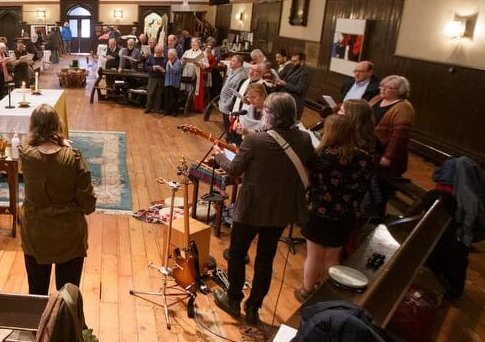Inclusive language paraphrases of the Psalms
by Ian Sowton, Holy Trinity Community, 2005.
Forward
This is not a new translation of the Psalms. It is a contemporary rendition, a paraphrase, which has two guiding purposes: to provide a text that is first, inclusive throughout and second, useful for both public congregational worship and also for private devotions.
The original impulse behind this enterprise was to provide an inclusive language text. The chief device I use to achieve this purpose is to employ a variety of names for God set in linguistic formulations that avoid the ubiquitous male pronouns, and so giving the effect, at least in English, of being gender-free. One of these names, El Shaddai, had some female connotations in the ancient Hebrew, and on two or three occasions I have linked it to feminine pronouns as a reminder that there have long since been feminine names for a deity thought of as including “female” characteristics. Another device serving the interests of inclusiveness is to switch from the third to the second person pronoun, thus moving from the impersonal, third person mode to the personal mode of direct address.
Since it definitely changes the rhetorical situation in the passage concerned, this device (which I first thought was original with me but very soon discovered was not) is used sparingly here, only as a last resort in the face of really extensive flights of incorrigibly male God-talk.

The Holy Trinity Psalter follows The Revised Common Lectionary*, which includes the complete list of lections for liturgical years A, B, and C, and was published by the Consultation on Common Texts (Nashville: Abingdon Press, 1992).
This means that it is not a complete psalter, since the Revised Common Lectionary (RCL) omits some psalms altogether and, in the case of many others, calls only for part(s) of a given psalm to be used on a given Sunday. And some psalms, in whole or in part, are used several times over the course of the whole three-year liturgical cycle.
On a dozen occasions the RCL calls for passages from other parts of Scripture to function as psalms. It lists most of these passages as alternatives to regular psalms. I have recast eight of these passages into the standard four-line format of this psalter. All twelve of them are collected toward the end of the psalter, on pp.163-175. That “standard four-line format” derives from a set of chants commonly used in our Church of the Holy Trinity, Toronto; but these psalm-texts can easily be pointed and sung, chanted, or spoken in various different ways.

The RCL quite often, and necessarily, includes fairly detailed rubrics. It is well outside the scope of The Holy Trinity Psalter to reproduce all these rubrics, though there are occasional references to them in its concluding section, “Psalms Listed According to the Liturgical Year

The editions of the Bible I have used as bases for this rendition of the Psalms are The New Revised Standard Version, The New English Bible (with the Apocrypha), and the Standard Edition of The Jerusalem Bible. The commentaries I have consulted regularly and with great profit are Volumes 19 and 21 of Word Biblical Commentary (Waco, Texas: Word Books, 1983) and Volume 20 (Dallas, Texas: Word Books, 1990). The tone of the original psalms ranged from solemnly cultic to urgently personal. I have tried to convey this range of tone without becoming either too staid on the one hand, or too distractingly colloquial on the other.
‘Metaphrase’ as a verb means to ‘put into other words’; as a noun it generally means ‘a literal translation’. There is, however, an established literary convention in regard especially to renditions of the Psalms, that uses the noun ‘metaphrase’ to mean a poetic version that is neither a literal translation nor a really close paraphrase. One could say that metaphrases of the Psalms are a species of poetic paraphrase that tries both to remain scrupulously faithful to the movement of thought and imagery of its original, and also to result in a new, contemporary devotional poem. We owe by far the most celebrated example of metaphrases of the Psalms in English to the brother and sister team of Sir Philip Sidney and Mary Herbert, Countess of Pembroke, in the 1580-90’s—an enterprise begun by Philip and finished by Mary, after his death, in poetry that is at least as good as his. Those ‘Sidnein Psalms’ were a remarkable flowering of Reformation piety and remain a monumental contribution to English devotional poetry. (I.S.)







